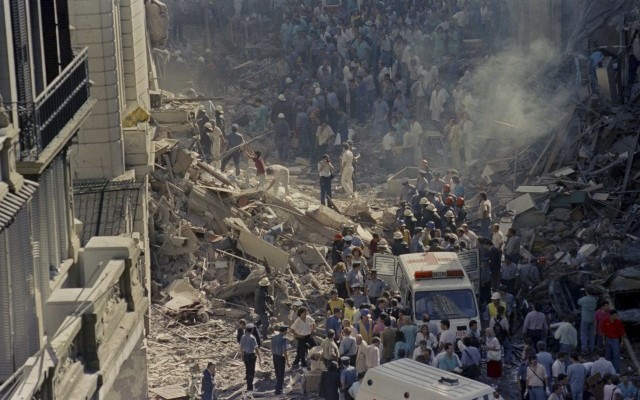Two decades too late, Argentina is finally moving forward with the 1992 Israeli embassy bombing case, issuing an international arrest warrant for two suspects.
By Atara Beck, World Israel News
A court in Argentina issued an international arrest warrant on Thursday for two members of the Hezbollah terrorist organization, who are suspected of involvement in the deadly attacks on the Israeli embassy in Argentina on March 17, 1992, media in Buenos Aires reported.
The bombing killed 29 people, four of them Israeli diplomats.
The warrants name Hussein Mohammed Ibrahim Suleiman and Jose Salan Al-Reda, two Hezbollah terrorists, as prime suspects in the bombing.
This bombing was one of two massive Hezbollah attacks against Jewish and Israeli targets in Argentina. On July 18, 1994, a Hezbollah terrorist detonated a massive car bomb in front of the AMIA Jewish community center in central Buenos Aires, killing 85 people and injuring more than 300. Most of the victims were Jews.
Suleiman, who was arrested by Jordanian authorities in 2001, confessed that he smuggled the explosives used in the attack. However, he was released a short time afterwards.
Israel has for years been putting pressure on Argentina, Interpol, and other parties to move forward with the case, and welcomed this dramatic development, over 20 years after the attack.
“Israel sees with satisfaction all the advances in the search for truth and justice in the cause against our embassy in Buenos Aires,” a foreign ministry official stated.
Devastating Attack on Israeli Embassy
A car bomb, estimated to have carried approximately 225-340kg of TNT, exploded in front of the embassy, near the front door.
Approximately 250 people, including ten Israelis, were injured. Extensive damage was caused to buildings and cars in the area.
One of the building’s wings collapsed in the massive blast. The wing that collapsed following the explosion had only two floors, the lower of which was being renovated. At the time of the explosion, approximately 50 embassy employees and construction workers were inside the building. Most of the employees were in the wing that did not collapse.
Several terror organizations, including some unknown ones, claimed responsibility for the terrorist attack. Hezbollah stated that they executed the attack in retaliation for the killing of their secretary general, Abbas al-Musawi, by Israel on February 16, 1992, approximately one month before the attack in Buenos Aires.




